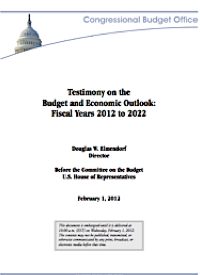
In the summary of its “Budget and Economic Outlook” published on Tuesday, the Congressional Budget Office (CBO) noted the supportability of deficit spending even under its “alternative” analysis. Noted the CBO: “Even if the fiscal policies specified by current law come to pass, budgetary challenges over the longer term remain — and the challenges will be much more acute if those policies do not remain in place.” It added:
Under both CBO’s baseline and its alternative fiscal scenario, the aging of the population and rising costs for health care will push spending for Social Security, Medicare, Medicaid, and other federal health care programs considerably higher as a percentage of GDP. If that rising level of spending is coupled with revenues that are held close to the average share of GDP that they have represented for the past 40 years (rather than being allowed to increase, as under current law), the resulting deficits will increase federal debt to unsupportable levels.
In non-economic terms, then, the CBO is saying that no matter how one looks at the numbers, the United States is headed for disaster.
Using assumptions that current law remains in place — with the Bush tax cuts disappearing — revenues in 2013 and beyond will increase by an astonishing $800 billion, and yet even that enormous tax hike isn’t enough to close the gap between expenditures and taxes. The CBO even took into account that inflation will drive peoples’ incomes into higher tax brackets, subjecting more of their taxable income to higher rates of taxation, and still that wasn’t enough. In that “steady-state” scenario the national debt, currently pushing $16 trillion, would explode to $21.6 trillion in less than 10 years.
The CBO then redid its calculations under the assumptions that the Bush tax cuts are retained, that Medicare payments to doctors are not cut by the 27 percent scheduled to go into effect in March and the temporary payroll tax cut also due to expire in March is extended. Those numbers resulted in projected increases in the country’s annual deficits by a factor of four over those in the “base” case. And interest costs on the debt that would be incurred to pay for the shortfalls would double in 10 years. The CBO report didn’t calculate what the national debt would be in 10 years under its “alternate” scenario.
The CBO became an advocate for higher taxes in its conclusion: “To prevent that outcome, policymakers will have to substantially restrain the growth of spending … raise revenues above their historical share of GDP, or pursue some combination of those two approaches.”
Republicans predictably used the CBO’s report to show that Obama’s “tax, print and spend” policies aren’t working, while Democrats used it to prove that additional revenues were required to close the deficits. Daniel Mitchell, an analyst with the Cato Institute, ran his own set of numbers based on the CBO report and concluded that higher taxes aren’t necessary to balance the budget after all: Just a “modest” reduction in spending is all it will take to generate surpluses (revenues exceeding expenditures!) in as soon as five years. He wrote at Townhall.com:
Even if we assume that the 2001 and 2003 tax cuts are made permanent, all that is needed is for politicians to put government on a modest diet so that overall spending grows by about 2 percent each year. In other words, make sure that the budget doesn’t grow faster than inflation.
He even defended his analysis against charges that just slowing down the rate of growth of government isn’t enough: “We should be drastically downsizing the federal government, not just restraining its growth. We should be focusing on the underlying problem of excessive government, not the symptom of too much red ink.” After all, if a government gets more money to spend, it will spend it.
The Young Americans for Liberty have produced a video (seen here) outlining seven reasons to oppose any higher taxes:
• They aren’t needed to balance the budget
• They just encourage the politicians to spend more
• They inflict harm on the economy
• They foment “social discord”
• They never raise as much as projected and so more taxes are needed
• They encourage demand for loopholes and special exemptions
• They undermine competitiveness around the world
The CBO numbers are scary. What’s even scarier is the potential that Republicans and Democrats will use the report to justify additional tax revenues in order to “solve” the problem they themselves created.
Illustration (above and left) Congressional Budget Office report: “Testimony on the Budget and Economic Outlook: Fiscal Years 2012 to 2022.”



